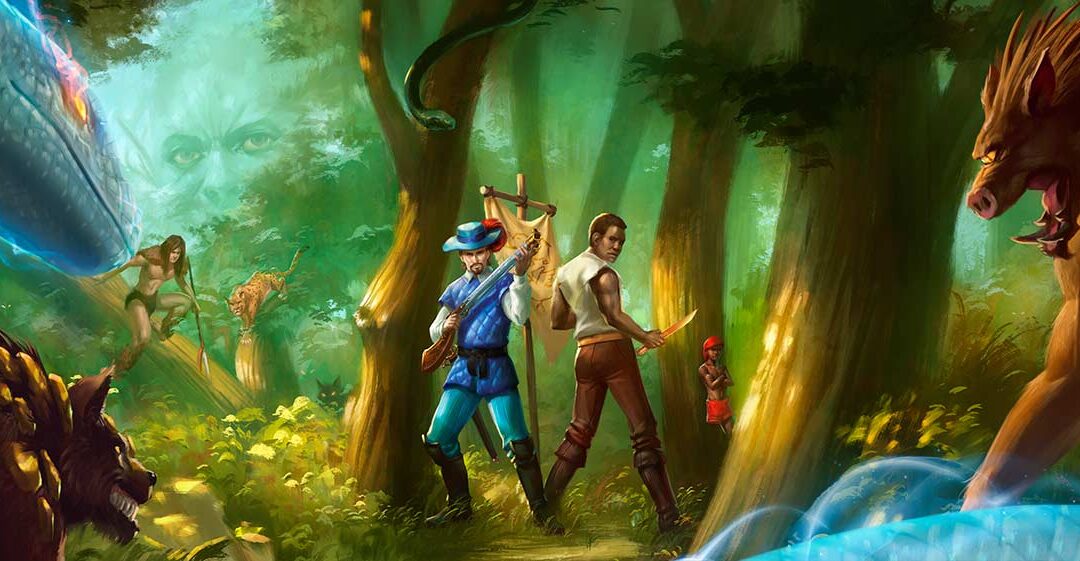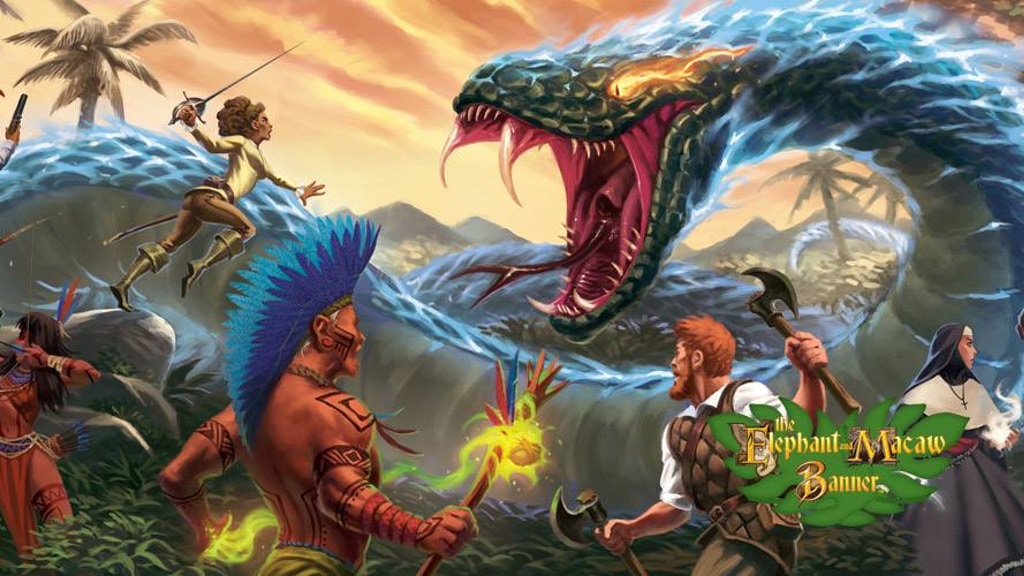After the curiosity aroused by our article on The Elephant & Macaw Banner RPG, we decided to interview two important personalities who allowed the realization of this work. We are talking about Christopher Kastensmidt and Tom McGrenery, respectively author and translator/project manager. Let’s listen what they added said about this Kickstarter project!

How important is it having read the stories to be able to enjoy the game?
You don’t need to have read the stories to play the game, but they can give some insight into the spirit of the project and lots of ideas for adventures. A lot of people call The Elephant and Macaw Banner (EAMB) the “Brazilian Witcher” and I think that´s fairly accurate. If you look at the stories, both of them take inspiration from local folklore (Poland vs. Brazil), both of them have characters going through the wilderness and hunting monsters, both have dry senses of humor, and both treat every encounter as a very real danger, no matter how supposedly “weak” the foe.
Of course, EAMB is set in 16th century Brazil, a “muskets and magic” setting. Imagine The Three Musketeers or Alatriste fighting monsters in the Brazilian wilderness and that will give you an idea.
The complete stories are available as a novel, published by Guardbridge Books, and available digitally on several platforms (Nook, Kindle, Kobo, iBooks) for $4.99.
Chris, how useful is the experience gained from video games when creating the role-playing game of Elephant & Macaw?
I’ve been working with video games since the 90s, and I definitely put that knowledge to use with EAMB. I learned a lot about game design over the last decades, and the most important lesson of all: learn from your audience. I ran a six-month playtest with over 40 players and went through three major revisions before arriving at the final version of the rules. My experience with video games taught me how to organize that level of testing and synthesize all that feedback into a usable form.
At the same time, I´ve been working as a writer since 2005, and during that time I´ve written and published short stories, novels, poetry, episodes of animated series, video games, comics, an upcoming full-length movie and of course, RPGs. I brought in a lot of storytelling baggage to this project, along with my background in game design. That gave me a lot of insight into mechanics and setting. This RPG really is the culmination of everything I´ve learned during my career.
Apart from the original setting, are there other aspects in which Elephant & Macaw differs from other role-playing games?
The mechanics are my own system, which are a combination of several factors. One was making an easily accessible system that anyone, anywhere could play. That’s why the game uses only six-sided dice, which even the remotest of players can access. Another factor was starting from scratch and letting my own philosophy dictate the rules. For example, there are no attributes or classes in the game. To me, people can acquire whatever skills they want and shouldn’t limit themselves into set “boxes” based on their career or other factors.
This reflects my own life a bit, since I’ve worked as an engineer, screenwriter, video game producer and college professor over time. I never let my diploma limit my career. I went out and learned what I wanted to do, one area at a time. And that´s how characters progress in the system: one area at a time..
Even though I was limited to using six-sided dice, I did try out a lot of different possibilities (exploding dice, using more or less dice) but I ended up with a very simple 3d6 system that worked mathematically with what I wanted to accomplish. I made a video about it in Portuguese and hope to make one soon in English as well.
Which role-playing games do you prefer and which have inspired you the most?
My favorite at the moment is Numenera, but the ones that I played most during my formative years were Dungeons & Dragons, MERP and Star Frontiers. I think that role-playing games had more of an impact on me as a person than on the system itself. I learned to create characters and tell stories, as well as research to develop interesting worlds.
The original stories were highly influenced by Sword and Sorcery. A lot of people comment on how the stories feel a lot like Fritz Leiber´s Lankhmar series, and they´re right!
The setting is fascinating but also far from the knowledge and experience of the average non-South American player. Apart from the books in the series, are there other sources, including films, to recommend to get familiar with the worlds of Elephant and Macaw?
One of the things that inspired the book were the 16th century chronicles written by visiting Europeans. A lot of them have been translated to English, look for:
- Preo de Magalhaes Gandavo (in “The Histories of Brazil”)
- Hans Staden (in “Hans Staden´s True History”)
- Jean de Lery (in “History of a Voyage to the Land of Brazil”)
- Anthony Knivet (in “The Admirable Adventures and Strange Fortunes of Master Anthony Knivet”)
Hans Staden in particular inspired Gerard van Oost, one of the protagonists in the original stories.
Also look for references about some of the most important figures from the time: José de Anchieta (a Jesuit missionary and now a saint), Francisco Orellana (leader of the first trip to navigate the entire Amazon River), and Nicolas Durand de Villegagnon (founder of Antarctic France). That´s a whole lot of material.
In terms of movies and miniseries, try Red Brazil (2012), Hans Staden (1999) and The Conquest (2000), if you can find them with subtitles.
In the game description, some monsters are referred to as “almost invincible”. Elephant & Macaw involves the creation of characters with important abilities but within human limits or real heroes who overcome these limits? And the progression of the character is such as to make him slowly capable of performing unthinkable acts and facing “almost invincible” enemies or even improving does he remain an aura of verisimilitude with human abilities?
There is a constant character progression in the game, but the characters never become “superhumans”, like in D&D and other systems. As I mentioned above, the books and RPG are much more inspired by sword & sorcery than epic fantasy. Danger is always very real.
As a minor spoiler, the protagonists of the novel face one of these “almost invincible” creatures in the book´s last adventure and the price is extremely high. I think that´s the idea with these kinds of creatures. Mere mortals shouldn´t be messing with them. If you do, you´ll pay the price.
Chris, how does the author of a book (who has a sort of authorship about the characters and a particular world) feel about leaving the creation of new elements of all kinds in the hands of other narrators?
Not just narrators, I´ve left the creation with other authors. I´ve already published adventures and supplements from four authors: Luciano Campos Tardock, Joao Beraldo, Luciano Paulo Giehl and Jan Piertezoon. The experience has been phenomenal. I spent the first 11 years of this process writing alone, and it has been great to take a little of that weight off my shoulders. The community has also published an enormous amount of non-official content: adventures and blog articles and such.
The results have been amazing, lots of new ideas I would never have come up with myself. I look forward to publishing many more authors down the line.
Tom, will be there additional publications for this role-playing game?
The Player’s Guide (which is the 1st two chapters of the rulebook, but as a free PDF) and the adventure “The Legend of the Golden Condor” are already available in English. Next in the pipeline for translation will be the setting book “The Royal Captaincy of Rio de Janeiro” because I think that many people will want to have more background in which to anchor their games. Soon after that we will have two more adventures – The Curse of Ipauna and The Mysterious Demesne of Dom Perestrelo.
I don’t want to promise too specific a timeline beyond that, but there continue to be new materials coming out for EAMB in Portuguese, which I hope we can get to English-speaking audiences very soon. For example, just a month or two ago saw the release of “The Abandoned Island”, which is the first part of an epic five-part adventure called “Flagellum Amazonis” (The Scourge of the Amazon).




Sono molto felice di vedere il materiale “Elephant and Macaw Flag” raggiungere altre lingue e attirare l’attenzione di persone provenienti da altri angoli del mondo! Un bel gol da un rpg che gioca con la storia del Brasile coloniale.
Mi è capitato di scrivere il supplemento di Rio de Janeiro. : D